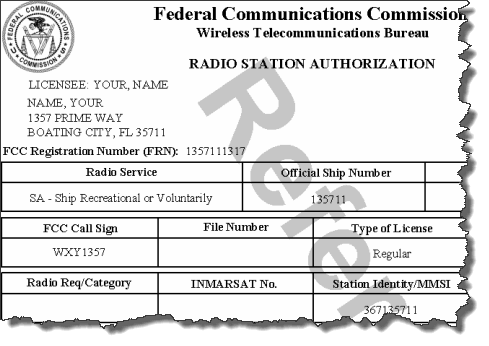My call sign (N0NJY) is issued by the US Federal Communications Commission. The FCC and agencies like it around the world, are the “authorities” that give license to radio operations.
There is a reason that governments “license” radios to operate. The radio spectrum, while considered “renewable” because it doesn’t fade away if you ‘use it up’, is still limited in size and scope. There is an international commission called the International Telecommunications Union, formed by all the countries around the world to determine best use of the spectrum, and the USA is a signatory to this treaty. It helps to keep things less chaotic. Can you imagine if everyone were trying to use the same frequency around the world for a Shortwave broadcast? No one could hear anything.
Certain frequencies have been allocated to various services, like Ham Radio, and to be able to use those frequencies, all countries have rules that require the Amateurs to become licensed. Those licenses in almost all countries are based on technical knowledge of how things work. The training we do contains information from rules and regulations, to safety to simple physics and math, radio theory, antenna theory and other pertinent information regarding our radio service.
While it is considered by most to be a “hobby”, it is still a radio service and we have to follow rules, the same as broadcast stations on the FM dial. And if we do not, like them, we can be fined as well!
In the USA now (and note I will only discuss US Amateur information because our license structure is different, than say, the UK, Canada or France for instance), we have three license classes.
Those three classes are called “Technician”, “General” and “Extra”. In times past, in the 1980s and 1990s, there were five classes of licenses, Novice, Technician, General, Advanced and Extra. Each had certain technical requirements, as well as a requirement to pass a Morse Code test. In 2006, Morse Code was dropped from the requirement. In about the year 2000, two of the classes were dropped. Now we are at no code requirement, and only three license classes.
The Technician class basically allows the new or beginners in, and give you radio privileges in the “Above 30 Mhz range”, for instance 2 Meters (144-148 Mhz) and 70 centimeters (420-450 Mhz) and so forth. (For a complete band plan, please see the following link from the American Radio Relay League: US Amateur Band Plan also please see this link for a more colorful depiction: ICOM America Band Plan)
Note that there are still licensed Amateurs holding Novice and Advanced class licenses, though we believe there are many fewer than there used to be. My wife held on to her Novice for many years after, and surprised the Volunteer Examiner team with her license when she upgraded to Technician!
The General Class license opens up many more bands including the coveted “Shortwave” or HF bands, where you can use Single Side Band, Morse Code and many other digital modes, along with AM operation, and FM in the 10 meter band. (In truth, there are many of these same modes you can use in the Technician bands, but almost all of the Tech frequencies are considered Line of Sight.)
Amateur Extra Class license, which is the one I hold, is the top of the heap, and gives you all frequencies, all modes, in all bands privileges. The Extra is the most technology-heavy license, and you must have taken, and passed all the other tests for the other classes first. (Note, you MAY take ALL tests at the same testing session, on the same day if you feel you’re ready, and almost all of the testers will offer you the opportunity to do so if you pass your first one right off.)
In the US amateur radio license examination system, there are three written examination elements [Elements 2, 3, and 4]. For each operator class, you must pass the elements indicated:
Operator Class Required Elements
Extra Written Elements 2, 3, 4
General Written Elements 2, 3
Technician Written Element 2
For those who were hams previous to the changing of the licensing structure, the FCC has grandfathered in the old classes.
Grandfathered Operator Classes:
Novice
Technician Plus
Advanced
This essentially means if you were a “Technician Plus”, and you renew, you renew at that license class. Tech Plus was the class created when they were transitioning to No Code requirements (eventually). There was Tech, and Tech Plus. Technically, when I was licensed I passed all elements required up to Advanced, but didn’t pass my code tests for the upper classes, thus, I was originally awarded a “Technician Plus” license and could operate on the HF bands. I later went back and re-passed all the written tests up to Extra after the Code requirement was dropped.
We will examine what you need to study, next time around!
Until Next Time!
73,
Rick, N0NJY



